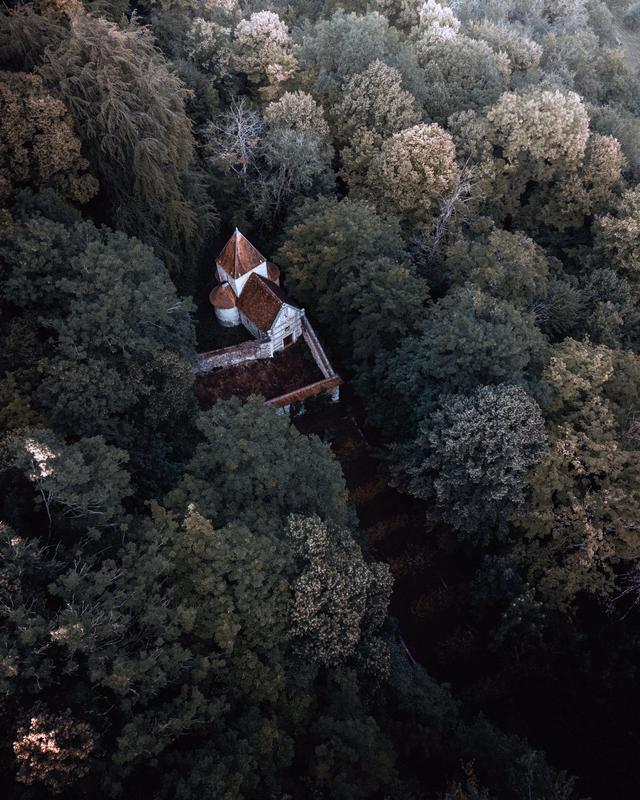Mandira Pattnaik
Image by Gaultier Salles on Unsplash
Mandira Pattnaik's writing has been accepted in Best Small Fictions 2021, Timber Journal, Bacopa Literary, Citron Review, Watershed Review, Passages North, DASH Journal, Miracle Monocle, Amsterdam Quarterly and Hypertext among other places. Mandira's work was also nominated for the 2021 & 2022 Pushcart Prize, Best Microfictions, Best of the Net, and received Honorable Mention in CRAFT Flash Fiction Contest 2020 and Litro Summer Contest 2021. You can find more of her work at mandirapattnaik.wordpress.com. On Twitter @MandiraPattnaik
The House in the Math Problem
I.
I’m the remainder in a math problem that involves a house. I’m the owner of this house, yet it never belonged to me, and never will. Sprouted in the middle of what were once shallow paddy fields, since encroached by real estate, it’ll reflect the leap of faith of my grandfather who envisioned an English country home, similar to an ansitz, complimented with a fishpond, cattle shed, a mango orchard, even a mini-soccer field, in the lush but swampy Bengal heartland.
The house will compete with its immediate neighbors, working people’s humble homes varyingly distemper-painted in the colors of a garden painting, and win the bouts unanimously. Every time.
The house will stand tall in all its sprawling grandeur as Alice lost in the woods. Designed with neoclassical features unfitting to the surroundings. Its bay windows, wide balconies, sunshades will mirror the aspirations of a retired Indian civil servant enamored by his British employers’ tastes.
To me, it’ll be grandfather’s abandoned home. He lived alone in his last few years and died intestate. His children had been living elsewhere for years, having migrated to nearby towns in search of livelihood. Some had traveled abroad on the wings of their dreams.
Grandfather, and his house, stood strong in spite of the desertions, in stoic submission to their fate. To him, it must have been an erasure of cumulative hopes.
As I stand on the narrow path emerging from the house, my car engine running, the last to leave after grandfather’s hearse has been carried out, I view his house as an emblem of urban centralization and outward migration. I reckon its gigantic rooms are destined to be uninhabited, at least for the foreseeable future, unless I can gather the means for its upkeep, or find remote employment so I can stay here. I consider a dozen other probabilities, and draw up a complex math problem.
II.
Of course, there are integers. Everything is integral, everyone disintegrates. The values, oscillating between the positives of integers and their negatives.
The first step at solving is grasping the problem. It starts with ruing—if my grandfather wasn’t so whimsical, and simply bequeathed his property to one of his sons or daughters, though I know for a fact none of them were willing.
My math problem now hurtles to step two: one of denial and interrogation. What if grandfather never built it in the first place? Never had what now appears to be quixotic ideas of building his home in a rural place, so bereft of basics. What if he agreed to sell it as his children would have wanted? What if this house wasn’t so mammoth, so out of tune to the demands of people who no longer harbor such giant ambitions, or really no longer can afford to. What if the world wasn’t this Orwellian. Or Machiavellian. Or Urban. Or Jingoistic. Or Dystopian…
Some equations will never balance.
III.
According to some, the air and water of a place decide how long and how deep the ruination of any object might take. I know it to be the law of nature—trees turn into stone. Soil becomes rocks, carbon turns to diamond.
This building is cement and bricks. I am someone of bare means. What am I to do to keep the place as it stands now.
I imagine the banyan taking roots in its crevices, colonizing it, the walls gathering moss, the window panes hanging by the last of their hinges.
I shut off the car engine, climb out, slam the door shut. Walking towards the fish pond in the partial occupation of hyacinths, I ruminate. How as children my cousins and I dived into its crystal clear waters for a quick bath! How grandfather used to sit on the ghat with a fishing rod in hand for hours, and the huge rohu he carried back proudly.
I quickly realize that instead of striking out improbable solutions and striving towards a solution, I’ve been muddling the problem with remembrances and nostalgia.
Not every problem is solvable, I understand that, maybe not all math calculations arrive at solutions.
IV.
Spending some time in supreme isolation, I turn and marvel at the house like one would study a barren hill, or view a canvas, letting his thoughts do the brush painting upon it with things he has on his mind. I think of setting up an orphanage, maybe a hospice, the vague entelechy of charity, not sure how it’d be received, because ideally this house, in its structure and plan, would support neither. I wonder if I let it be, as a mausoleum, gratifying myself by the false vanity of owning something that doesn’t belong to me and of which I’ve no use.
Deciding to spend a few hours inside the house, alone in the company of family pictures hung on gold plated frames, I walk towards it.
I’ve never lived here because immediately after I was born, my parents shifted to another city where dad had a job. We returned for vacations, but neither regularly nor for prolonged periods. The earth here holds my roots, my mother used to say that. I’ve long realized the air here has a distilled quality that warms me. I used to think I felt no attachment to grandfather’s house, and still, still, I do?
Zero is nothing, yet it is everything! Not all we do or feel is explainable.
On the beautiful open terrace, I spend the night letting my thoughts wander the cosmos. Between galaxies and dark matter, the math grows to Einsteinian proportions. Maybe I need a constant to help me arrive at a solution.
V.
The following evening, I hang a sturdy lock on its iron-grill gates, its shiny windows tinged with the colors of dusk, look on. So does its pillared courtyard. The mahogany doors collect themselves to somber aloofness. I can hear every nail and hinge on the furniture pieces groan in pain.
The house itself, in a posture perfected by monarchs, stands regal against all odds. The neighborhood houses huddle in gossip, lament the fate of their imposing big brother, but I suspect they’re secretly whispering — Ah! How the mighty fall!
I string the collected memories of the house, bundle out the voices of its occupants still trashing about its walls, the way it is with things that’ll never come back, and climb into my car, rev up the engine.
It is a sky I’ll never forget, the silhouette of the house in my rear mirror. I find the drive difficult with the heaviness of the piled years.
The humble abacus has survived calculators and computers. My math problem will solve itself.
__________________________________________________________________________________________________________________________________________________________________________
__________________________________________________________________________________________________________________________________________________________________________
__________________________________________________________________________________________________________________________________________________________________________
__________________________________________________________________________________________________________________________________________________________________________
__________________________________________________________________________________________________________________________________________________________________________
©2022 West Trade Review
Stay Connected to Our Literary Community. Subscribe to Our Newsletter




